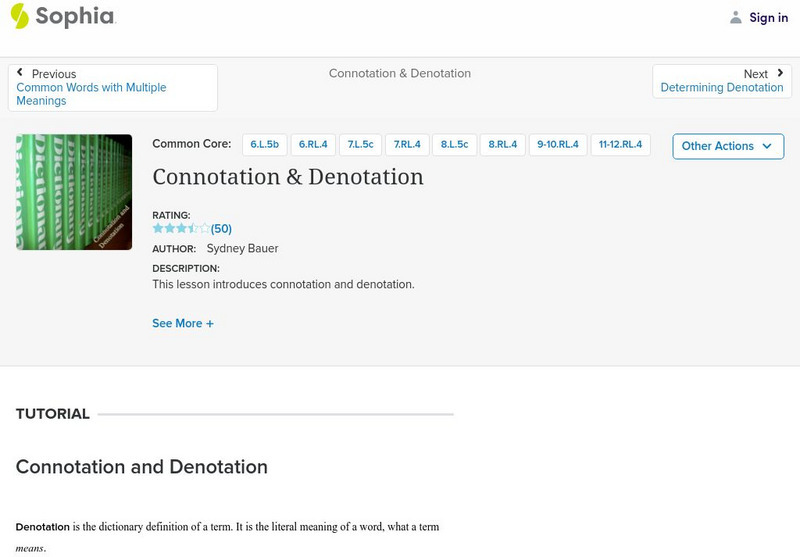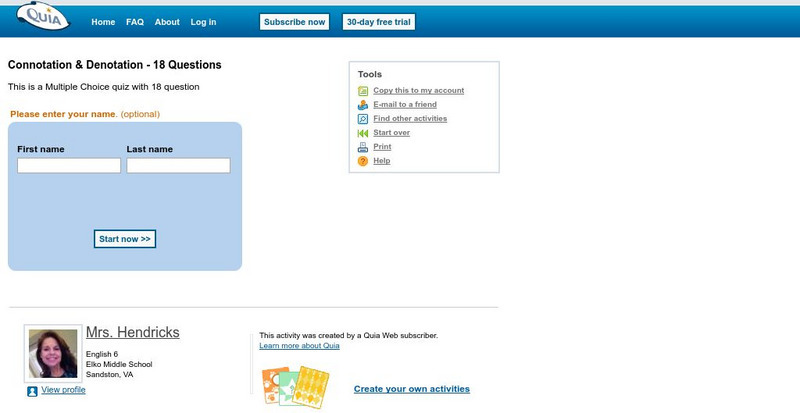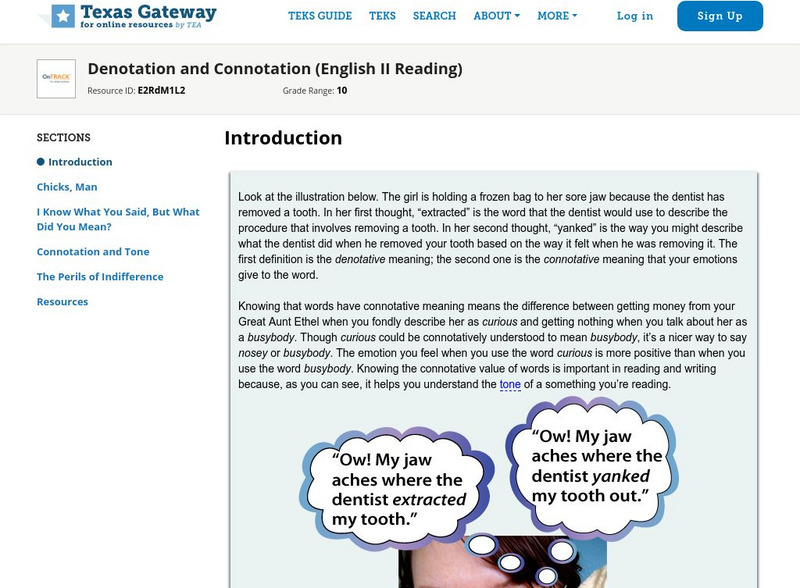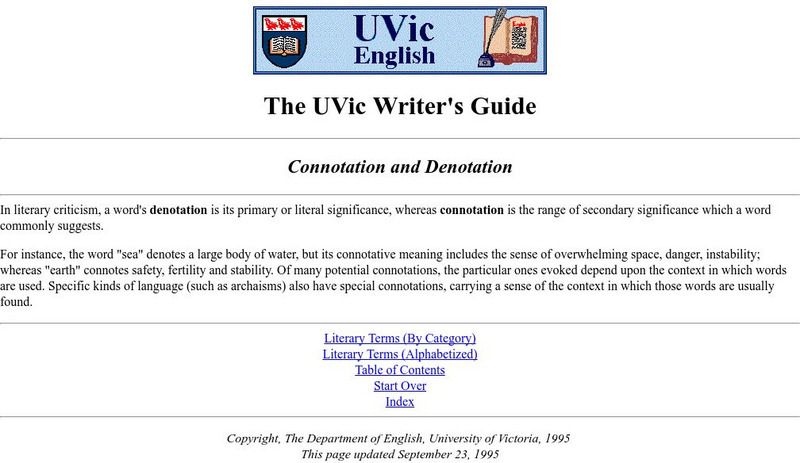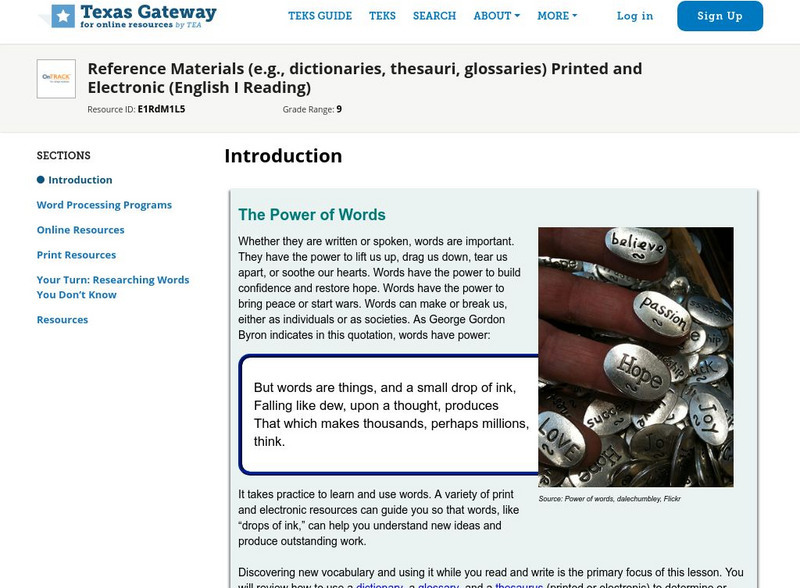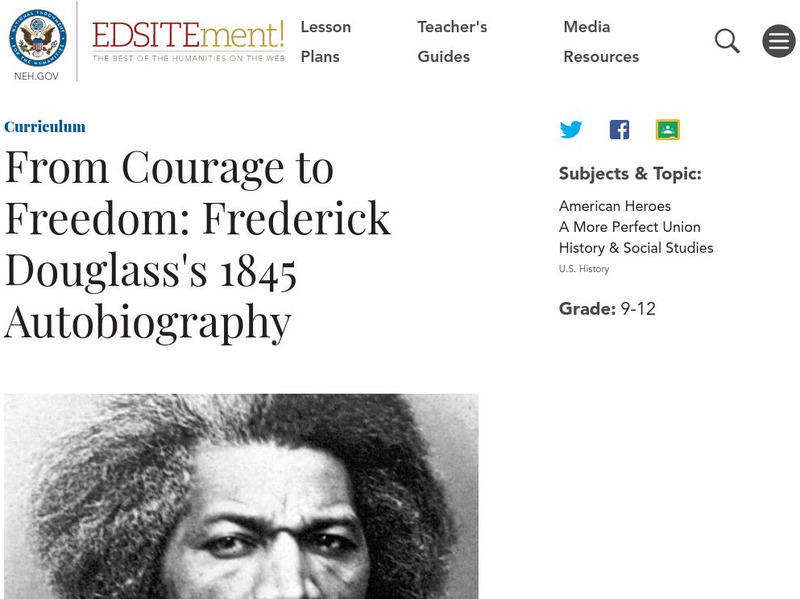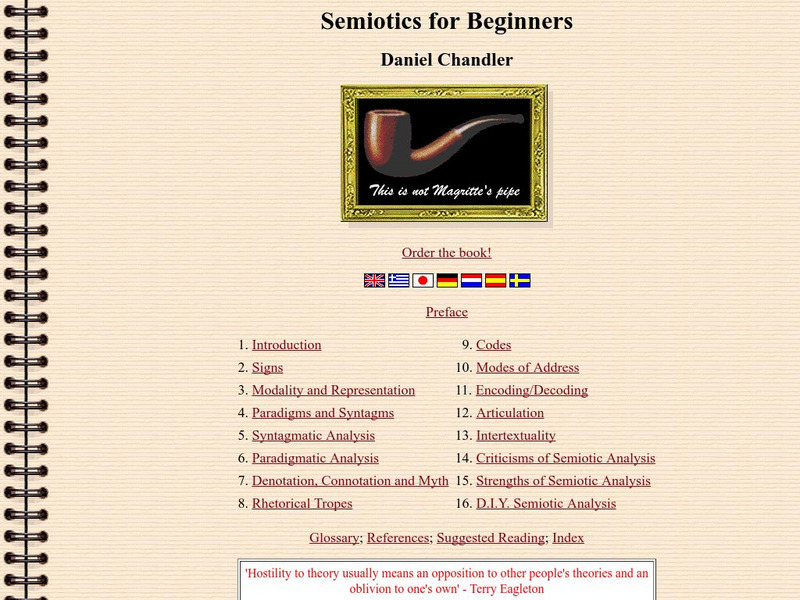Hi, what do you want to do?
Sophia Learning
Sophia: Connotation and Denotation: Lesson 2
This lesson discusses the difference between connotation and denotation. It is 2 of 2 in the series titled "Connotation and Denotation." L.11-12.5b Nuance
Sophia Learning
Sophia: Connotation and Denotation
This lesson discusses connotation and denotation; it defines each and provides examples showing how words can have very similar denotations but very different connotations. This information is offered in text and audio.
Other
Bedford/st. Martin's: Connotation and Denotation
A brief explanation distinguishes connotation from denotation. At the bottom, click on practice exercises. L.11-12.5b Nuance
Quia
Quia: Connotation and Denotation
Read a sentence and determine which word carries the most positive or negative connotation to fill in the blanks in this 18-question quiz.
ReadWriteThink
Read Write Think: Avalanche, Aztek, or Bravada? A Connotation Minilesson
Interesting instructional activity which stresses the importance of connotation in writing by examining car names. Middle schoolers participate in an interactive instructional activity in which they learn the value of connotation and...
TES Global
Blendspace: Connotation/denotation
Work through links to activities, assessments, websites, and videos to learn about connotation and denotation.
Texas Education Agency
Texas Gateway: Denotation and Connotation (English Ii Reading)
This lesson is about how words can have emotional connections for readers. Connotation and denotation are a part of language, and knowing about them can help you understand not only the author's purpose, but also the author's attitude...
University of Victoria (Canada)
The U Vic Writer's Guide: Literary Term: Connotation and Denotation
This site provides a brief explanation of the distinction between "denotation" and "connotation."
Georgia Department of Education
Ga Virtual Learning:20th Century and Modern Poetry:postcolonialism:george Orwell
This lesson from 20th Century and Modern Poetry focuses on George Orwell and his autobiographical account of "Shooting an Elephant." It features links to the text of "Shooting an Elephant," a study guide/lesson plan, questions concerning...
Towson University
Towson University: Ows: Commonly Confused Words: Connote / Denote
This entry focuses on the commonly confused words connote and denote including providing an explanation, examples, and a link to a quiz/exercise.
Texas Education Agency
Texas Gateway: Reference Materials Printed and Electronic
Find out how to use dictionaries, glossaries, and thesauri in order to determine meanings of words and phrases, including their denotations, connotations, and etymologies.
Texas Education Agency
Texas Gateway: Reference Materials Printed and Electronic
Learn how to use dictionaries, glossaries, and thesauri in order to determine meanings of words and phrases, including their denotations, connotations, and etymologies.
Other
Ed Sitement! "Shooting an Elephant": George Orwell's Essay on His Life in Burma
This site shares a PDF worksheet for students to organize connotative and denotative meanings. Students will read "Shooting an Elephant" and then complete the chart with explanations of the denotative and connotative meanings. L.11-12.5b...
Towson University
Towson University: Ows: Connote / Denote Exercise 1
This is a 10-question, self-grading practice/quiz for the commonly confused words Connote and Denote.
Towson University
Towson University:ows: Connote / Denote Exercise 2
This is a 10-question, self-grading practice/quiz for the commonly confused words Connote and Denote.
Sophia Learning
Sophia: Connotation: Lesson 2
This lesson introduces connotation and provides examples. It is 2 of 3 in the series titled "Connotation."
Sophia Learning
Sophia: Evaluating the Connotation
This lesson focuses on evaluating the connotation of a vocabulary word. It defines connotation and gives an example. It details three steps: read the word in context, determine the tone of the overall reading, and compare the tone with...
Texas Education Agency
Texas Gateway: Reference Materials Printed and Electronic
Learn how to use dictionaries, glossaries, and thesauri in order to determine meanings of words and phrases, including their denotations, connotations, and etymologies.
Texas Education Agency
Texas Gateway: Reference Materials: Printed and Electronic
You will learn how to use dictionaries, glossaries, and thesauri in order to determine meanings of words and phrases, including their denotations, connotations, and etymologies.
Other
Streeter: Semiotics and Advertising
A slide show that offers a good study of connotation and how it refers to semiotics. Symbols are not the things they represent. L.11-12.5b Nuance
National Endowment for the Humanities
Neh: Edsit Ement: From Courage to Freedom:frederick Douglass's 1845 Autobiography
In this 3-lesson unit, students will read Douglass's narrative. They will analyze Douglass's vivid first-hand accounts of the lives of slaves and the behavior of slave owners to see how he successfully contrasts reality with romanticism...
Other
The University of Wales: Semiotics for Beginners
Click on Denotation, Connotation, and Myth. A discourse in the use of "denotation" and "connotation" as they refer to semiotics and cultural myths.
Texas Education Agency
Texas Gateway: Diction and Tone (English Iii Reading)
[Accessible by TX Educators. Free Registration/Login Required] In this lesson, students will learn how to find the tone in a passage using a close reading strategy. They will also look at diction and discover that examining a writer's...
Texas Education Agency
Texas Gateway: Diction and Tone (English Ii Reading)
This lesson will help students identify diction and tone in their reading and will help them answer these questions: What does the author mean? What is the author's attitude about what he or she is writing? How will my understanding of a...






